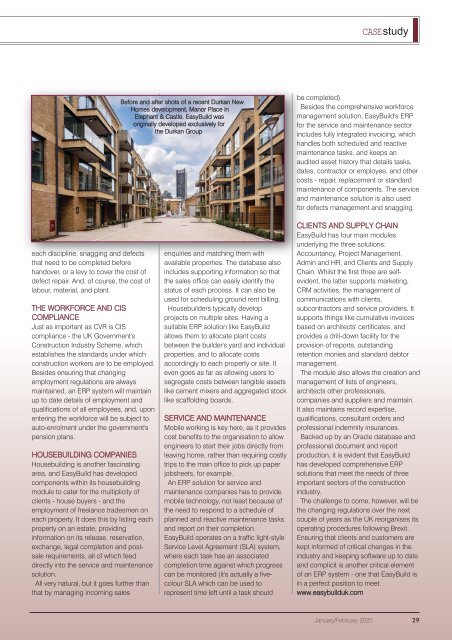CU Jan-Feb 2020
Create successful ePaper yourself
Turn your PDF publications into a flip-book with our unique Google optimized e-Paper software.
CASEstudy<br />
Before and after shots of a recent Durkan New<br />
Homes development, Manor Place in<br />
Elephant & Castle. EasyBuild was<br />
originally developed exclusively for<br />
the Durkan Group<br />
be completed).<br />
Besides the comprehensive workforce<br />
management solution, EasyBuild's ERP<br />
for the service and maintenance sector<br />
includes fully integrated invoicing, which<br />
handles both scheduled and reactive<br />
maintenance tasks, and keeps an<br />
audited asset history that details tasks,<br />
dates, contractor or employee, and other<br />
costs - repair, replacement or standard<br />
maintenance of components. The service<br />
and maintenance solution is also used<br />
for defects management and snagging.<br />
each discipline, snagging and defects<br />
that need to be completed before<br />
handover, or a levy to cover the cost of<br />
defect repair. And, of course, the cost of<br />
labour, material, and plant.<br />
THE WORKFORCE AND CIS<br />
COMPLIANCE<br />
Just as important as CVR is CIS<br />
compliance - the UK Government's<br />
Construction Industry Scheme, which<br />
establishes the standards under which<br />
construction workers are to be employed.<br />
Besides ensuring that changing<br />
employment regulations are always<br />
maintained, an ERP system will maintain<br />
up to date details of employment and<br />
qualifications of all employees, and, upon<br />
entering the workforce will be subject to<br />
auto-enrolment under the government's<br />
pension plans.<br />
HOUSEBUILDING COMPANIES<br />
Housebuilding is another fascinating<br />
area, and EasyBuild has developed<br />
components within its housebuilding<br />
module to cater for the multiplicity of<br />
clients - house buyers - and the<br />
employment of freelance tradesmen on<br />
each property. It does this by listing each<br />
property on an estate, providing<br />
information on its release, reservation,<br />
exchange, legal completion and postsale<br />
requirements, all of which feed<br />
directly into the service and maintenance<br />
solution.<br />
All very natural, but it goes further than<br />
that by managing incoming sales<br />
enquiries and matching them with<br />
available properties. The database also<br />
includes supporting information so that<br />
the sales office can easily identify the<br />
status of each process. It can also be<br />
used for scheduling ground rent billing.<br />
Housebuilders typically develop<br />
projects on multiple sites. Having a<br />
suitable ERP solution like EasyBuild<br />
allows them to allocate plant costs<br />
between the builder's yard and individual<br />
properties, and to allocate costs<br />
accordingly to each property or site. It<br />
even goes as far as allowing users to<br />
segregate costs between tangible assets<br />
like cement mixers and aggregated stock<br />
like scaffolding boards.<br />
SERVICE AND MAINTENANCE<br />
Mobile working is key here, as it provides<br />
cost benefits to the organisation to allow<br />
engineers to start their jobs directly from<br />
leaving home, rather than requiring costly<br />
trips to the main office to pick up paper<br />
jobsheets, for example.<br />
An ERP solution for service and<br />
maintenance companies has to provide<br />
mobile technology, not least because of<br />
the need to respond to a schedule of<br />
planned and reactive maintenance tasks<br />
and report on their completion.<br />
EasyBuild operates on a traffic light-style<br />
Service Level Agreement (SLA) system,<br />
where each task has an associated<br />
completion time against which progress<br />
can be monitored (it's actually a fivecolour<br />
SLA which can be used to<br />
represent time left until a task should<br />
CLIENTS AND SUPPLY CHAIN<br />
EasyBuild has four main modules<br />
underlying the three solutions:<br />
Accountancy, Project Management,<br />
Admin and HR, and Clients and Supply<br />
Chain. Whilst the first three are selfevident,<br />
the latter supports marketing,<br />
CRM activities, the management of<br />
communications with clients,<br />
subcontractors and service providers. It<br />
supports things like cumulative invoices<br />
based on architects' certificates, and<br />
provides a drill-down facility for the<br />
provision of reports, outstanding<br />
retention monies and standard debtor<br />
management.<br />
The module also allows the creation and<br />
management of lists of engineers,<br />
architects other professionals,<br />
companies and suppliers and maintain.<br />
It also maintains record expertise,<br />
qualifications, consultant orders and<br />
professional indemnity insurances.<br />
Backed up by an Oracle database and<br />
professional document and report<br />
production, it is evident that EasyBuild<br />
has developed comprehensive ERP<br />
solutions that meet the needs of three<br />
important sectors of the construction<br />
industry.<br />
The challenge to come, however, will be<br />
the changing regulations over the next<br />
couple of years as the UK reorganises its<br />
operating procedures following Brexit.<br />
Ensuring that clients and customers are<br />
kept informed of critical changes in the<br />
industry and keeping software up to date<br />
and complicit is another critical element<br />
of an ERP system - one that EasyBuild is<br />
in a perfect position to meet.<br />
www.easybuilduk.com<br />
<strong>Jan</strong>uary/<strong>Feb</strong>ruary <strong>2020</strong> 29

















